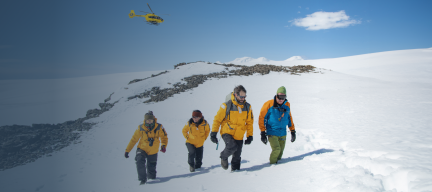
Tundra to Table: Sourcing Food Sustainably and with Integrity
Our Purpose:
“Quark Expeditions has had the honor of traveling to the Inuit homelands of Greenland and Nunavut for 30 years,” says Alex McNeil, Director of Expedition Experience and Innovation for Quark Expeditions. “And for more than a decade I’ve had the pleasure, as a member of the Quark Expeditions team, of visiting these regions and developing meaningful relationships in local communities. These relationships have inspired us to provide this platform, Tundra to Table: Inuit Culinary Experience, for local chefs in the Arctic to showcase the Inuit cuisine and culture of Greenland and Nunavut. The ultimate purpose of this culinary experience is to support Inuit chefs as they share the stories of their people through food.”
It’s an honor for the Quark Expeditions team to facilitate and fund this Inuit food initiative, and we’re proud that any profits generated by this program will go to support food-focused initiatives in the Arctic.
Q&A
Supply chains in Greenland and Nunavut are very different, yet both regions have an established network of small and large suppliers. Our procurement strategy will be led by our Inuit partners and be designed in collaboration with the chefs who will be hosting the program onboard. They will design procurement plans that bring the freshest and most regionally authentic ingredients on board.
The style of food served will be ‘Inuit-fusion,’ combining traditional foods of the Inuit with other contemporary culinary styles. Not all ingredients will be sourced locally. In fact, approximately 50% of the ingredients used in the program will be purchased through our traditional supply channels. Approximately 30% will be sourced from regional suppliers (larger food companies in Greenland and Nunavut that also export their products), and the remaining 20% will be purchased locally from smaller suppliers and communities, or foraged by the Inuit chefs themselves.
We will not source food from any communities experiencing food insecurity without the express endorsement from a council of local representatives. Such an endorsement will confirm that any food purchases made in their community will not contribute to issues related to food security. The needs of local residents always come first.
In addition to celebrating Inuit food and culture, voyages that include this culinary experience will also provide a venue, such as chef-led foraging walks, for guests to learn more about the evolution of food systems in the Arctic, including affordability, integration of harvested foods into the supply chain, scarcity and the stigmatization of certain ingredients. One of the topics will be the perception of certain foods eaten in this part of the world that aren’t consumed elsewhere (whale, seal) and the misconceptions that exist. It’s always been part of our ethos to immerse ourselves fully in the places we visit, and for us that means understanding their way of life as much as possible.
No animal species or population that currently carries a special conservation designation will be used in the Tundra to Table: Inuit Culinary Experience. That means we will not procure any species that is deemed to be threatened, vulnerable or endangered.
Our preliminary resource for this analysis will be the IUCN* list of threatened species which would alert us to a species of concern. In addition, we will also work with regional scientific and conservation agencies to confirm the status of local populations of wildlife. For example, a species might not be of concern broadly but a specific local population could be vulnerable or vice versa.
*Established in 1964, the International Union for Conservation of Nature’s (IUCN) Red List of Threatened Species has evolved to become the world’s most comprehensive information source on the global extinction risk status of animal, fungus and plant species.
Yes. We will only use foods that have been procured through ethical and sustainable harvesting and hunting methods, preferably by local Indigenous people of the Arctic for whom traditional harvest and hunting rights are part of their way of life.
It’s our aim that this program will support existing food-focused initiatives in the Arctic, as well as encourage the development of new, grassroots food-focused projects in Inuit Nunangat (Inuit homeland in Canada) and Greenland.
Contributions made from the profits will be disclosed in our annual sustainability report.





